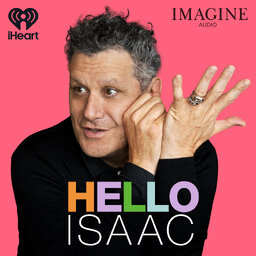Journalist & Documentarian, Soledad O’Brien
Isaac Mizrahi talks to Soledad O’Brien about the event that helped define her role as a journalist, her husband’s unwavering support of her career, what a CNN story about Britney Spears revealed to her and more.
Follow Hello Isaac on @helloisaacpodcast on Instagram and TikTok, Isaac @imisaacmizrahi on Instagram and TikTok and Soledad O’Brien at @soledadobrien.
(Recorded on October 3, 2023)
In 1 playlist(s)
Hello Isaac with Isaac Mizrahi
Isaac Mizrahi is an expert - at almost everything! He’s an iconic fashion designer, actor, singer, …Social links
Follow podcast
Recent clips

Emmy-Winning Actor and Director, Pamela Adlon
51:37

Interior Designer & TV Host, Jeremiah Brent
49:51

Podcast Host & Crooked Media Co-Founder, Jon Lovett
50:53
 Hello Isaac with Isaac Mizrahi
Hello Isaac with Isaac Mizrahi